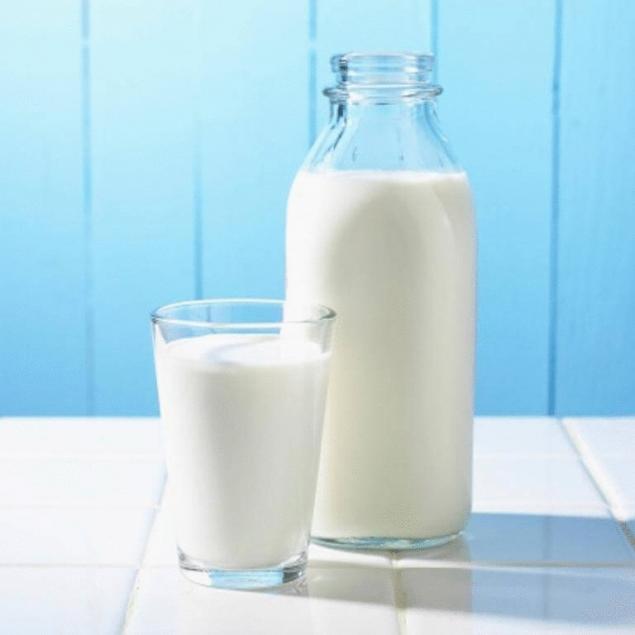811
What milk is right for you? Compare 10 types
More and more people due to various reasons refuse cow's milk. Doctor Carrie Torrence, nutrition specialist, I tried to consistently explain why certain varieties of milk alternative and vegan drinks can be for you.

On the shelves of large supermarkets near the usual packages of cow's milk can be goat milk, several varieties of soy, milk drinks nuts. The demand for substitutes is increasing every year. According to British scientists, 4 out of 10 British already consume such dairy "alternatives" in the hot drinks with Breakfast and used in cooking various dishes.
One reason for this is the fact that in many people milk is hard to digest and causes bloating, gas, diarrhea. A frequent reason for this low content of the enzyme lactase, which allows you to break down lactose – the sugar contained in dairy products. There are people who suffer from intolerance to cow's milk (lactase deficiency) or milk protein casein, or other allergies related to cow's milk. Allergy to cow's milk is one of the typical health problems of preschool children, affecting approximately 2-3%. The symptoms can be very different, ranging from irritation of skin to digestive problems.
Skim, bold, or solid?
Recent scientific research indicates that sour milk is not necessarily healthy. Yes, it has less fat and calories and more calcium than whole milk. But some experts suggest that the saturated fat contained in dairy products, may not constitute a risk to health. Thus, choosing skim milk instead of whole, we deprive ourselves of such a useful fat-soluble nutrients like vitamins A and E.
Bold milk is considered to be the product of "healthy food" (because it has less fat than whole), but it reduced the contents of fat-soluble vitamins. If you drink this milk, you need to obtain an additional fat-soluble vitamins from other sources – for example, eat more leafy vegetables (lettuce of different varieties), or have a fresh vegetable salad with vegetable oil.
The best milk for babies
The best food for babies is mother's milk, at least the first 6 months (who recommendation – at least 2 years or even more – Vegetarian), and then you can gradually, not earlier than the year old, start giving whole cow's milk. Bold milk can be given to children starting from the 2nd year of life, and skim – not before 5 years. You need to make sure that your child is not allergic to cow's milk. Some dairy "alternatives" such as soy drinks, young children may not even fit.
How to choose the "best" for themselves milk?
We offer you a comparison of 10 different types of milk. Regardless, decide what you ultimately drink whole cow's milk or not, always include in your diet are non-dairy sources of calcium, as different types of lettuce, nuts and seeds, including almonds and sesame seeds.
1.Traditional (whole) cow's milk
Feature: all natural product, rich in protein, a valuable source of calcium. "Organic" cow's milk contains more beneficial omega-3 unsaturated fatty acids and less antibiotics and pesticides. Some prefer homogenized milk – the fat molecules have already been treated, which helps the absorption in the digestive system.
Well: vegetarian.
Taste: delicate, creamy.
Cooking: good to use with a ready Breakfast, cooking, cold beverages and also by itself; perfect for sauces and baking.
Tested for the preparation of this material, whole milk powder brand Tesco.
Nutritional value per 100 ml: 68 calories, 122 mg calcium, 4 g fat, 2.6 g carbonated fat, 4.7 g sugar, 3.4 g protein.
2. Cow's milk without the lactose
Characteristics: cow's milk, especially tuthilltown thus, to remove lactose. It added the enzyme lactase. Contains the same nutrients as regular cow's milk.
Well: for people with lactose intolerance.
Taste: usually the same as cow's milk.
Cooking: used the same as cow's milk.
Tested for the preparation of this material, whole cow's milk lactose free brand Asda.
Nutritional value per 100 ml: 58 calories, 135 mg calcium, 3.5 g fat, 2 g carbonated fat, 2.7 g sugar, 3.9 g protein.
3. Cow's milk is A2
Characteristics: cow's milk containing only the A2 protein. Normal cow's milk contains various proteins, including the group of Caseins, the main of which A1 and A2. Recent scientific studies show that intestinal discomfort often causes the proteins of type A1, So if you don't have lactose intolerance in General, but sometimes after drinking milk you feel bloating, then this is the milk for you.
Good: for those who suffer from intolerance to milk protein A1.
Taste: same as ordinary cow's milk.
Cooking: used the same as cow's milk.
Tested for the preparation of this material, whole cow's milk, A2 brand Morrisons.
Nutritional value per 100 ml: 64 calories, 120 mg of calcium, 3.6 g fat, 2.4 g carbonated fat, 4.7 g sugar, 3.2 g protein.
4.Goat's milk
Feature: natural product, nutritionally similar to cow's milk.
Good: for those who have intolerance to cow's milk because goat's fat particles are smaller and it has less lactose.
Taste: strong, peculiar, sweet with a salty taste.
Cooking: can be added to tea, coffee, hot chocolate (though it will be the drink of preference – Vegetarian). The recipe is usually successfully replace cow.
Tested for the preparation of this material, whole goat milk brand Sainsbury's.
Nutritional value per 100 ml: 61 kcal, 120 mg calcium, 3.6 g fat, 2.5 g of carbonated fat, 4.3 g sugar, 2.8 g protein.
5. Soy milk
Feature: comparable in protein content to cow's milk, but it has a low fat content. Soy products help to lower cholesterol, but to achieve this result you need to consume about 25 g of soy protein, i.e., for example, 3-4 cups of soy milk daily. In some brands of soy milk add calcium and vitamins a and D that is useful.
Good: for those who do not drink cow's milk and looking for a drink with low fat content. It is preferable to drink soy milk fortified with calcium and vitamins a and D.
Flavor: hazelnut; milk thick.
Cooking: good for tea and coffee. Great for home baking.
Tested for the preparation of this material: unsweetened soy milk brand Vivesoy – Tesco.
Nutritional value per 100 ml: 37 kcal, 120 mg calcium, 1.7 g fat, 0.26 g of carbonated fat, 0.8 g sugar, 3.1 g protein.
6. Almond milk
Feature: made from mixture of crushed almonds with spring water, enriched with calcium and vitamins including D and B12.
Good: for vegans and anyone avoiding animal products for different reasons. Enriched with vitamin B12 is necessary for vegans and vegetarians.
Taste: delicate nutty flavor; for drinking it is better to choose unsweetened.
Cooking: good for coffee, a little worse – other hot drinks, in recipes without changing the number replaces the cow.
Tested for the preparation of this material: unsweetened almond milk brand Alpro – Ocado.
Nutritional value per 100 ml: 13 calories, 120 mg calcium, 1.1. g fat, 0.1 g carbonated fat, 0.1 g sugar, 0.4 g protein. (Carefully read the information on the packaging: the content of almonds in almond milk from different manufacturers can be very different – Vegetarian).
7. Coconut milk
Feature: made with pressed coconut. Contains artificially added calcium, small amounts of protein, and high – carbonated fat.
Well: vegetarian, vegan.
Taste: light, with a hint of coconut.
Cooking: can be added to Breakfast cereals, tea, coffee. Great for baking because the delicate coconut taste is not too bright and not "scores" of other tastes. Especially good with coconut milk to fry thin pancakes vegan, because it is quite liquid.
Tested for the preparation of this material: coconut milk brand is Free From – Tesco.
Nutrition per 100ml: 25 calories, 120 mg calcium, 1.8 g fat, 1.6 g carbonated fat, 1.6 g sugar, 0.2 g protein.
8.Hemp milk
Feature: based drink hemp seed, rich in calcium and vitamin D.
Good: for vegans.
Taste: delicate, sweet.
Cooking: perfect for adding to hot and cold drinks, smoothies, tea, coffee, sauces. And you can mix hemp milk with fruit and honey and freeze for a tasty vegan "ice cream"!
Tested for the preparation of this material: hemp milk brands Braham & Murray Good Hemp Original – Tesco.
Nutritional value per 100 ml: 39 kcal, 120 mg calcium, 2.5 g fat, 0.2 g carbonated fat, 1.6 g of sugar, 0.04 g of protein.
9. Oat milk
Feature: made from cereals with added vitamins and calcium. A lower content of carbonated fat.
Good: for vegans. Low-calorie, healthy, like oatmeal.
Taste: creamy with a distinct aftertaste.
Cooking: is not minimized, so it's good for making white sauce (with lemon, among other ingredients).
Tested for the preparation of this material: oat milk brand Oatly Oat — Sainsbury's.
Nutritional value per 100 ml: 45 calories, 120 mg calcium, 1.5 g fat, 0.2 g carbonated fat, 4 g sugar, 1.0 g protein.
10. Rice milk
Feature: a sweet drink containing protein and enriched with calcium.
Well: for people with lactose and cow's milk, and soy protein.
Taste: sweet.
Cooking: does not give hot drinks a milky colour, so to add to coffee and tea choice is bad. Rice milk liquid is necessary to take into account when cooking (sometimes it is necessary to add more flour).
Tested for the preparation of this material: rice milk Rice Dream brand –Holland & Barrett.
Nutritional value per 100 ml: 47 kcal, 120 mg calcium, 1.0 g fat, 0.1 g carbonated fat, 4 g sugar, 0.1 g protein.
Used in the preparation of this English article was written on 25 March 2015 Kerry Torrens (Torrens Kerry) is an American physician, expert on nutrition. The information contained herein is given solely for your information is not promotional material or a physician's prescription, and not intended to replace consultation with a specialist.published
P. S. And remember, only by changing their consumption — together we change the world! ©
Source: vegetarian.ru/articles/kakoe-moloko-vam-podkhodit-sravnivaem-10-vidov.html

On the shelves of large supermarkets near the usual packages of cow's milk can be goat milk, several varieties of soy, milk drinks nuts. The demand for substitutes is increasing every year. According to British scientists, 4 out of 10 British already consume such dairy "alternatives" in the hot drinks with Breakfast and used in cooking various dishes.
One reason for this is the fact that in many people milk is hard to digest and causes bloating, gas, diarrhea. A frequent reason for this low content of the enzyme lactase, which allows you to break down lactose – the sugar contained in dairy products. There are people who suffer from intolerance to cow's milk (lactase deficiency) or milk protein casein, or other allergies related to cow's milk. Allergy to cow's milk is one of the typical health problems of preschool children, affecting approximately 2-3%. The symptoms can be very different, ranging from irritation of skin to digestive problems.
Skim, bold, or solid?
Recent scientific research indicates that sour milk is not necessarily healthy. Yes, it has less fat and calories and more calcium than whole milk. But some experts suggest that the saturated fat contained in dairy products, may not constitute a risk to health. Thus, choosing skim milk instead of whole, we deprive ourselves of such a useful fat-soluble nutrients like vitamins A and E.
Bold milk is considered to be the product of "healthy food" (because it has less fat than whole), but it reduced the contents of fat-soluble vitamins. If you drink this milk, you need to obtain an additional fat-soluble vitamins from other sources – for example, eat more leafy vegetables (lettuce of different varieties), or have a fresh vegetable salad with vegetable oil.
The best milk for babies
The best food for babies is mother's milk, at least the first 6 months (who recommendation – at least 2 years or even more – Vegetarian), and then you can gradually, not earlier than the year old, start giving whole cow's milk. Bold milk can be given to children starting from the 2nd year of life, and skim – not before 5 years. You need to make sure that your child is not allergic to cow's milk. Some dairy "alternatives" such as soy drinks, young children may not even fit.
How to choose the "best" for themselves milk?
We offer you a comparison of 10 different types of milk. Regardless, decide what you ultimately drink whole cow's milk or not, always include in your diet are non-dairy sources of calcium, as different types of lettuce, nuts and seeds, including almonds and sesame seeds.
1.Traditional (whole) cow's milk
Feature: all natural product, rich in protein, a valuable source of calcium. "Organic" cow's milk contains more beneficial omega-3 unsaturated fatty acids and less antibiotics and pesticides. Some prefer homogenized milk – the fat molecules have already been treated, which helps the absorption in the digestive system.
Well: vegetarian.
Taste: delicate, creamy.
Cooking: good to use with a ready Breakfast, cooking, cold beverages and also by itself; perfect for sauces and baking.
Tested for the preparation of this material, whole milk powder brand Tesco.
Nutritional value per 100 ml: 68 calories, 122 mg calcium, 4 g fat, 2.6 g carbonated fat, 4.7 g sugar, 3.4 g protein.
2. Cow's milk without the lactose
Characteristics: cow's milk, especially tuthilltown thus, to remove lactose. It added the enzyme lactase. Contains the same nutrients as regular cow's milk.
Well: for people with lactose intolerance.
Taste: usually the same as cow's milk.
Cooking: used the same as cow's milk.
Tested for the preparation of this material, whole cow's milk lactose free brand Asda.
Nutritional value per 100 ml: 58 calories, 135 mg calcium, 3.5 g fat, 2 g carbonated fat, 2.7 g sugar, 3.9 g protein.
3. Cow's milk is A2
Characteristics: cow's milk containing only the A2 protein. Normal cow's milk contains various proteins, including the group of Caseins, the main of which A1 and A2. Recent scientific studies show that intestinal discomfort often causes the proteins of type A1, So if you don't have lactose intolerance in General, but sometimes after drinking milk you feel bloating, then this is the milk for you.
Good: for those who suffer from intolerance to milk protein A1.
Taste: same as ordinary cow's milk.
Cooking: used the same as cow's milk.
Tested for the preparation of this material, whole cow's milk, A2 brand Morrisons.
Nutritional value per 100 ml: 64 calories, 120 mg of calcium, 3.6 g fat, 2.4 g carbonated fat, 4.7 g sugar, 3.2 g protein.
4.Goat's milk
Feature: natural product, nutritionally similar to cow's milk.
Good: for those who have intolerance to cow's milk because goat's fat particles are smaller and it has less lactose.
Taste: strong, peculiar, sweet with a salty taste.
Cooking: can be added to tea, coffee, hot chocolate (though it will be the drink of preference – Vegetarian). The recipe is usually successfully replace cow.
Tested for the preparation of this material, whole goat milk brand Sainsbury's.
Nutritional value per 100 ml: 61 kcal, 120 mg calcium, 3.6 g fat, 2.5 g of carbonated fat, 4.3 g sugar, 2.8 g protein.
5. Soy milk
Feature: comparable in protein content to cow's milk, but it has a low fat content. Soy products help to lower cholesterol, but to achieve this result you need to consume about 25 g of soy protein, i.e., for example, 3-4 cups of soy milk daily. In some brands of soy milk add calcium and vitamins a and D that is useful.
Good: for those who do not drink cow's milk and looking for a drink with low fat content. It is preferable to drink soy milk fortified with calcium and vitamins a and D.
Flavor: hazelnut; milk thick.
Cooking: good for tea and coffee. Great for home baking.
Tested for the preparation of this material: unsweetened soy milk brand Vivesoy – Tesco.
Nutritional value per 100 ml: 37 kcal, 120 mg calcium, 1.7 g fat, 0.26 g of carbonated fat, 0.8 g sugar, 3.1 g protein.
6. Almond milk
Feature: made from mixture of crushed almonds with spring water, enriched with calcium and vitamins including D and B12.
Good: for vegans and anyone avoiding animal products for different reasons. Enriched with vitamin B12 is necessary for vegans and vegetarians.
Taste: delicate nutty flavor; for drinking it is better to choose unsweetened.
Cooking: good for coffee, a little worse – other hot drinks, in recipes without changing the number replaces the cow.
Tested for the preparation of this material: unsweetened almond milk brand Alpro – Ocado.
Nutritional value per 100 ml: 13 calories, 120 mg calcium, 1.1. g fat, 0.1 g carbonated fat, 0.1 g sugar, 0.4 g protein. (Carefully read the information on the packaging: the content of almonds in almond milk from different manufacturers can be very different – Vegetarian).
7. Coconut milk
Feature: made with pressed coconut. Contains artificially added calcium, small amounts of protein, and high – carbonated fat.
Well: vegetarian, vegan.
Taste: light, with a hint of coconut.
Cooking: can be added to Breakfast cereals, tea, coffee. Great for baking because the delicate coconut taste is not too bright and not "scores" of other tastes. Especially good with coconut milk to fry thin pancakes vegan, because it is quite liquid.
Tested for the preparation of this material: coconut milk brand is Free From – Tesco.
Nutrition per 100ml: 25 calories, 120 mg calcium, 1.8 g fat, 1.6 g carbonated fat, 1.6 g sugar, 0.2 g protein.
8.Hemp milk
Feature: based drink hemp seed, rich in calcium and vitamin D.
Good: for vegans.
Taste: delicate, sweet.
Cooking: perfect for adding to hot and cold drinks, smoothies, tea, coffee, sauces. And you can mix hemp milk with fruit and honey and freeze for a tasty vegan "ice cream"!
Tested for the preparation of this material: hemp milk brands Braham & Murray Good Hemp Original – Tesco.
Nutritional value per 100 ml: 39 kcal, 120 mg calcium, 2.5 g fat, 0.2 g carbonated fat, 1.6 g of sugar, 0.04 g of protein.
9. Oat milk
Feature: made from cereals with added vitamins and calcium. A lower content of carbonated fat.
Good: for vegans. Low-calorie, healthy, like oatmeal.
Taste: creamy with a distinct aftertaste.
Cooking: is not minimized, so it's good for making white sauce (with lemon, among other ingredients).
Tested for the preparation of this material: oat milk brand Oatly Oat — Sainsbury's.
Nutritional value per 100 ml: 45 calories, 120 mg calcium, 1.5 g fat, 0.2 g carbonated fat, 4 g sugar, 1.0 g protein.
10. Rice milk
Feature: a sweet drink containing protein and enriched with calcium.
Well: for people with lactose and cow's milk, and soy protein.
Taste: sweet.
Cooking: does not give hot drinks a milky colour, so to add to coffee and tea choice is bad. Rice milk liquid is necessary to take into account when cooking (sometimes it is necessary to add more flour).
Tested for the preparation of this material: rice milk Rice Dream brand –Holland & Barrett.
Nutritional value per 100 ml: 47 kcal, 120 mg calcium, 1.0 g fat, 0.1 g carbonated fat, 4 g sugar, 0.1 g protein.
Used in the preparation of this English article was written on 25 March 2015 Kerry Torrens (Torrens Kerry) is an American physician, expert on nutrition. The information contained herein is given solely for your information is not promotional material or a physician's prescription, and not intended to replace consultation with a specialist.published
P. S. And remember, only by changing their consumption — together we change the world! ©
Source: vegetarian.ru/articles/kakoe-moloko-vam-podkhodit-sravnivaem-10-vidov.html
Cuba: Secrets of a Long Life from Centuries
Scientists have found another similarity between Earth and Titan























